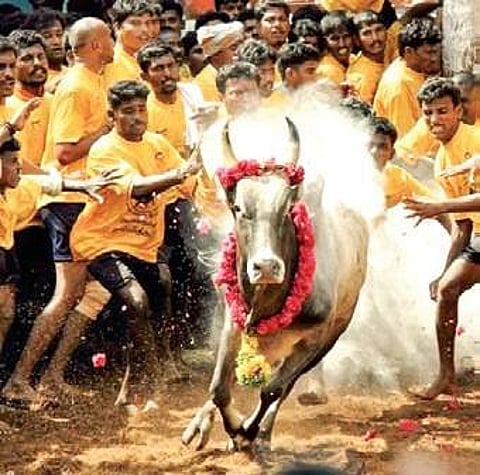

Recent protests everywhere shows people across the city coming out in scores in support of Jallikattu. But what is the protest really about — sustaining culture, bulls, farmers or the dairy industry?! The mix is boiling hot.
In October 2016, world leaders at UN Habitat III agreed that for sustainable development, cities and human settlements should promote civic engagement and cultural expressions, foster social cohesion and inclusion, and enhance safety in peaceful and pluralistic societies, where the needs of all inhabitants are met. Sustainable Cities must be committed to promote culture with respect for diversity, and equality as the key elements in the ‘Humanisation of their Cities/Settlements’.
Whether it is the famous Running of the Bulls (made popular by a recent Bollywood movie), Bull fighting or Jallikattu, the tussle between man and bull has been a sport for centuries across the world. In Spain, young men would hurry cattle to the market to sell them, by racing in front of them to their pens without being overtaken. This turned into a competition that became so popular that many cities adopted it and turned tradition into a tourist attraction.
In Tamil Nadu, Jallikattu was practiced as a bull taming event in the villages since the Tamil classical period (400-100 BC). On Maatu Pongal day, prizes are given to the young men who stop a running bull released into a crowd after rituals to the village deity.
These men train to stay fit and prepare to grab the bull’s hump and ride it for as long as possible or till they remove flags from the horns. Bos indicus bulls are bred specifically by farmers in villages for the event in which temple bulls (koil kaalai) also participate. After the event, tamed weak bulls are used for domestic activities and agriculture, and the strong bulls as studs.
Animal activists and People for Ethical Treatment of Animals (PETA) protested against bulls being ill-treated and participants being cruel. Today there is more that is being said regarding the involvement of ‘foreign’ species which are being introduced, thereby possibly wiping out indigenous bulls’ role in the local dairy industry.
In a day and age where industrial processes are so much a part of every food industry, it would be naïve for the dairy industry to rely on indigenous bulls if they were not as ‘productive’ as any other. The point about farmers losing their livelihood is highlighted as part of the Jallikattu ruling as well — but let us not lose focus now from the real issue.
All sporting events involving horses and dogs have strict rules. If not, there could be a robust debate about every kind of animal sport, pageant or show. Jallikattu is no exception and should also develop a plan that details roles and procedures.
Let’s support steps that better protect animals, participants and spectators from harm. Like arts, sport brings peoples’ character to the fore; but not sport that is inhumane. Activities that embrace cultural values enhance social inclusivity and holistic sustainability making our settlements ‘humanised’. Culture is central to holistic sustainability. Be aware and stay on the Bull’s side!